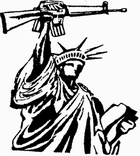Click Here to Puruse the old Flyover-press
Please Click ton Ab
Liberty knows no compromise
Click to Subscribe to Our Free Daily News Service
Donate today to help defray the costs of this important free newsletter
A Universal Ethic for All Mankind: A Detailed Review and Synopsis of The Ethics of Liberty
by Murray N. Rothbard
Chapter 23: The Inner Contradictions of the State
Compiled and Edited
by
Dr. Jimmy T. (Gunny) LaBaume
Discussions of the necessity of government necessarily take place within a context of centuries of State existence to which the public has become habituated and resigned itself to the existence of the State as an evil but inescapable force of nature to which there is no alternative.
Assume a group of strangers have suddenly arrived on Earth and are considering what sort of social arrangements to live under. One presents the typical argument for the State—e.g. if everyone remains free to possess weapons and the right of self-defense, then society will be wrecked by a constant war of each against the other. So, the conclusion is that everyone must turn over all of their guns and decision-making power to the Jones family. This is clearly absurd. Who would protect them from the Jones family? Nevertheless, this is precisely the type of argument to which we now blindly adhere.
The theory of “limited government” is unrealistic and inconsistent for several reasons. In the first place, there is no reason to assume that a compulsory monopoly of violence will remain “limited.” Historically, no government has long remained “limited” and there are reasons to suppose there never will be one. Once the principle of coercion is established, there is every reason to believe that it will be expanded. It is simply in the economic interest of the State rulers to do so. In a free market society, the maximization of wealth by one person or group benefits everyone. But maximization of income and wealth of the State (and its rulers) can only be accomplished parasitically at the expense of the rest of society.
Given unchecked power the State (and its rulers) will act to maximize that power (and wealth) and expand it beyond the supposed “limits.” History demonstrates that any power, once granted or acquired, will be used and abused.
Furthermore, there is an inner contradiction in the ideal of a neutral or impartial State. There simply is no such thing as a “neutral” tax. As John C. Calhoun pointed out, the very existence of taxation negates any possibility of neutrality. The least that will happen will be the creation of two antagonistic social classes: 1) the “ruling” class (net tax consumers who live off taxation) and; 2) and the “ruled” class (net tax-payers who provide the support).
Calhoun also pointed out that a Constitution will not keep the government limited—given a monopoly Supreme Court selected by the self-same government and granted the power of ultimate decision-making.
There are several other fatal flaws and inconsistencies in the concept of limited, laissez-faire government. First is the general acceptance of the State as being necessary for the creation and development of law. T his is historically incorrect because most law emerged out of non-State institutions. Examples include tribal custom, common-law judges and courts, the law merchant in mercantile courts, or admiralty law in tribunals set up by shippers. Judges did not make law. Instead they discovered generally accepted principles of law and then applied them to specific cases. Th e same was true in private Roman law and in ancient TIreland where there was no trace of State-administered justice. Legal matters were handled by competing professional jurists with enforcement by competing and voluntarily supported insurance agencies. These customary rules were not haphazard or arbitrary but consciously rooted in natural law, discoverable by man's reason.
In addition, the State, by its nature, cannot obey its own legal rules. This necessarily renders it deficient and self-contradictory as a maker of law.
There are two unique (and essential) features of the State: its power to 1) tax (acquire revenue by coercion and hence robbery) and; 2) prevent its subjects from hiring any other defense agency (compulsory monopoly of defense). As a result, the State violates its own laws that it sets down for its subjects.
For example, the State says that citizens may not use force to take property that belongs to someone else, yet it does exactly that through its power to tax. In addition, the State says that a person may only use force upon another in self-defense, yet it forcibly imposes its jurisdiction on persons who may have done nothing wrong. In other words, it aggresses against the rights of its citizens--in ways that its own rules say those same citizens may not do. That is to say that the State may steal but its subjects may not. It may aggress (initiate the use of force) against its subjects but prohibits them from doing the same thing.
In a proper legal system, the lawmaker would follow all of its own rules. So, because the State does not and cannot do this, it is not and cannot be a legal system. Since it acts outside its own law, the State (as per its own rules) is illegal.
There is yet another inner contradiction in the lasses-faire theory of government. If government is to be limited to “protection” and taxation is “limited” to providing only that service, how much protection should be provided and how much taxes should be levied? As an analogy, suppose, for example, that government is “limited” to supplying clothing for its citizens. How much and at what cost? On the free market, how much and what quality are determined by means of voluntary purchases. What criterion can government apply? There is none. Such governmental decisions can only be arbitrarily made.
In addition to how much taxation, who will be forced to pay must also be determined. The commonly adopted “ability to pay” theory is the philosophy of the highway robber—extract as much loot from the victim as you can get away with. The fallacy is revealed by considering what would happen if everyone were forced to pay for every good and service in proportion to his income. There would be no pricing system at all and no market system could work.
Then there is the size of the State. Just how large is the territorial area of a compulsory monopoly of force to be? The world has always lived in an “international anarchy”—e.g. with no one government presiding over the various countries. And yet, international relations between private citizens of different countries have generally functioned quite smoothly. Wars are waged by governments and not private citizens.
Would a laissez-fairist recognize the right to secede? I f so where is the logical stopping-point? Would it be a small district or a city or a borough or a block or, finally, a particular individual? Since there is no logical stopping-point short of the individual , individuals may secede and patronize their own defense agencies and the State will crumble.
And there is yet another crucial inconsistency in limiting the government to protection. If it is legitimate to tax to pay for protection, why not tax to provide other goods and services? Why not to build steel plants, provide shoes, dams, postal service, etc.? If the laissez-fairists object to this as tax-coercion, then the same objection can be made for police or judicial service. So, government limited to protection cannot be sustained even within the laissez-faire ideal itself because the “limits” can be stretched to virtually complete collectivism.
Continue to the next chapter...
*Note: We hold no special government issued licenses or permits. We don't accept government subsidies, bailouts, low-cost loans, insurance, or other privileges. We don't lobby for laws that hurt our competitors. We actively oppose protectionism and invite all foreign competitors to try to under price us. We do not lobby for tariffs, quotas, or anti-dumping laws. We do not support the government's budget deficits: we hold no government or agency securities.
To Subscribe to our daily e-mail alert service, send an e-mail with the word "subscribe" on the subject line.
Visit Our Advertisers
Email for Advertising Rates
Use the link or send an email to: adinfo@flyover-press.com

